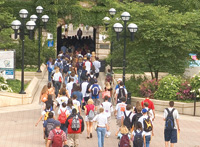Highlights | Michigan Student Experience
President’s Donor Challenge Raises $45 Million
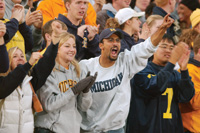
U-M students and faculty are recognized around the world as the leaders and best. To continue bringing the brightest minds to the University, President Mary Sue Coleman launched the President’s Donor Challenge to support need-based financial aid and create endowed professorships. The initiative—which runs from October 1, 2006 through December 31, 2007—raised $45 million as of June 30, 2007.
The President’s Challenge brought in almost $15 million from 4,500 donors to provide aid to students with financial need. This aspect of the program provides a match for each donor gift for a total impact of $29 million in fiscal 2007.
U-M provides a wide range of programs to help meet the financial needs of students. The M-PACT program increases scholarships and helps reduce loan aid to Michigan residents. Michigan Tradition awards provide renewable $10,000 grants for students from under- represented high schools, geographic areas, and socioeconomic populations while Michigan Achievement Awards provide renewable $5,000 grants to economically disadvantaged students. In addition, U-M was one of a few top institutions chosen to participate in the Jack Kent Cooke Foundation program, which provides scholarships to transferring community college students.
In addition to student aid, the President’s Challenge raised $30 million to create 20 fully endowed professorships. The professorships cover a wide range of schools and disciplines, and demonstrate the breadth of donors’ interests.
NEW STUDENT PROFILE
The 5,400 first-year students who enrolled in September 2006 came from 41 countries and all 50 states. They were selected from a group of 26,000 well-qualified applicants.
ACADEMICS
67% had 3.8 or higher GPA | 28% had a perfect 4.0 high school GPA | 92% ranked in the top 10% of their graduating class | 36% had an ACT composite score between 30 and 36 | 43% were members of a high school academic honor society.
ACTIVITIES
56% play a musical instrument | 28% were elected to at least one student government office | 20% had writing published or were editors of high school publications | 30% have won awards for community service | 10% have started their own businesses | 25% have won all-city, regional, state, or national athletic awards.
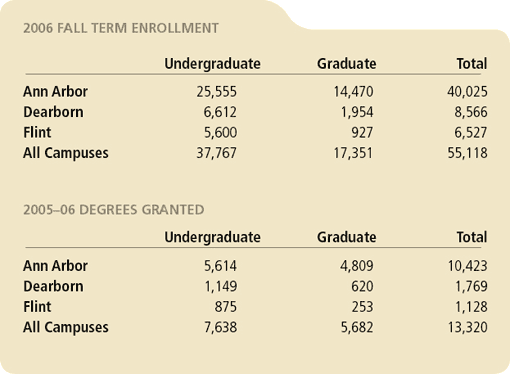
U-M Continues Commitment to Interdisciplinary Education
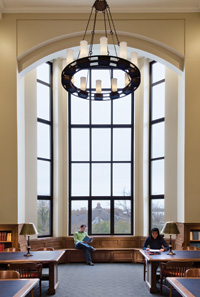
To prepare for a life of productive endeavor in the 21st century, tomorrow’s leaders must learn problem solving across disciplines and have the skills and confidence to explore uncharted territories of knowledge and practice. U-M continues to provide students with interdisciplinary opportunities as a regular part of their intellectual training, particularly at the undergraduate level.
For example, the President’s Multidisciplinary Learning and Team Teaching initiative launched or approved funding for several new programs and courses in fiscal 2007:
- The Program in Informatics
- Practicum in a Multidisciplinary World
- Applied Complex Systems: Emergent Challenges
- Public Policy 201—Systematic Thinking About the Problems of the Day
- Interdisciplinary Undergraduate Course on Contemporary Social Issues in Southeast Asia

U-M Leads Nation with Teaching Volunteers
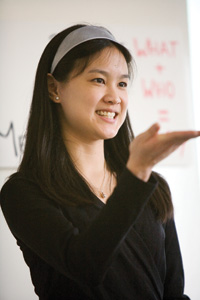 Teach For America recruits recent college graduates to teach in underserved rural and urban schools. Their mission: to enlist our nation’s most promising future leaders in the movement to eliminate educational inequality. U-M currently leads the nation, with more than 300 students volunteering for the program and 110 graduates currently teaching.
Teach For America recruits recent college graduates to teach in underserved rural and urban schools. Their mission: to enlist our nation’s most promising future leaders in the movement to eliminate educational inequality. U-M currently leads the nation, with more than 300 students volunteering for the program and 110 graduates currently teaching.
U-M Teach for America volunteers, who come from a wide range of backgrounds and academic programs, have an equally wide range of personal motivations for joining the program. For 2007 LSA graduate and Teach for America campus campaign manager Grace Chen, fond childhood memories of listening to her mother read to her sparked a lifelong passion for learning.
Chen plans to spend two years working with underprivileged students in rural North Carolina. The Shipman Scholar and member of the Alpha Delta Pi sorority graduated Phi Beta Kappa with degrees in organizational studies and psychology. She says Teach for America will give her an opportunity to use her organizational skills and further her enthusiasm for education.
Growing up in Ohio, Chen saw the difference education made in the lives of her parents, both immigrants from Taiwan. “Education is an issue I’m very passionate about,” she says. “A lot of societal problems can be solved through education. Every child deserves a good education.”





